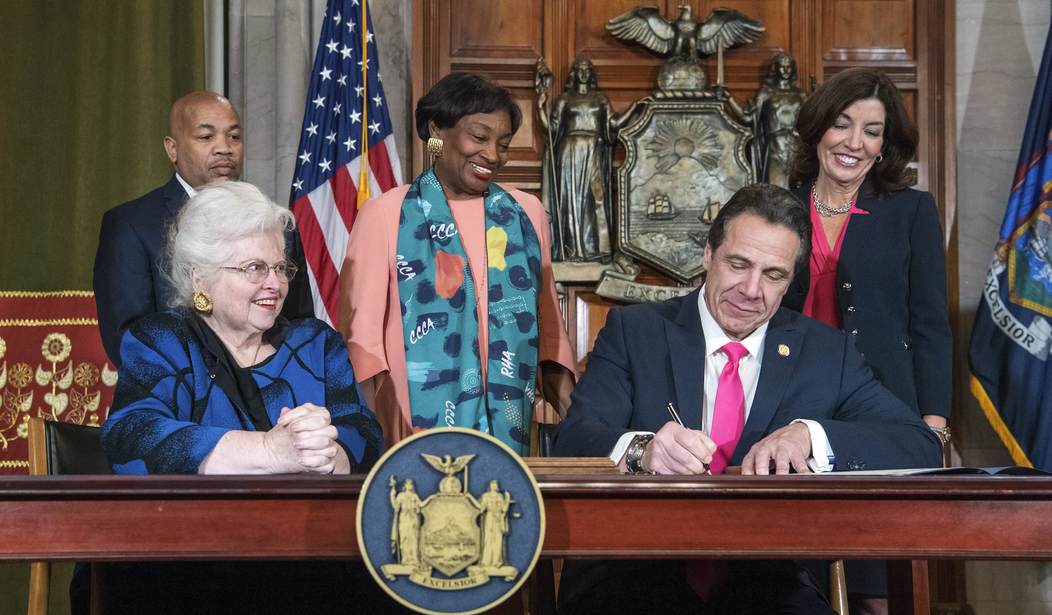On Tuesday night, Gov. Andrew Cuomo (D-N.Y.) signed a radical law defending Roe v. Wade and making abortion a “fundamental right.” The law allows abortion throughout pregnancy in the name of protecting a woman’s health, and repeals protections for babies who survive abortion. But the law also removes New York’s protections for wanted babies and their mothers, which were part of the state’s criminal code on fetal homicide.
This means that if someone beats a pregnant mother and causes her to lose her unborn baby, the law no longer considers that act a homicide. When New York legalized abortion in 1970, the law still defined the death of an unborn baby after 24 weeks gestational age as homicide — fetal homicide.
The Reproductive Health Act (S.B.240) passed and signed on Tuesday — the 46th anniversary of Roe v. Wade — explicitly amends the penal code to remove protections for wanted babies who die in domestic violence or other kinds of assault.
The law includes the New York criminal code’s definition of homicide, explicitly striking any language about unborn babies: “Homicide means conduct which causes the death of a person [or an unborn child with which a female has been pregnant for more than twenty-four weeks] under circumstances constituting murder, manslaughter in the first degree, manslaughter in the second degree, or criminally negligent homicide[, abortion in the first degree or self-abortion in the first degree].”
The law includes an explicit definition of the term “person:” “when referring to the victim of a homicide, means a human being who has been born and is alive.”
If someone abuses a pregnant woman and kills her 25-week-old unborn baby, New York law no longer imposes a penalty.
“By completely gutting abortion from New York’s criminal law, the RHA removes the state’s only prosecutorial tool for holding violent abusers accountable for the death of wanted unborn children,” Michele Sterlace-Accorsi, executive director of Feminists Choosing Life of New York, wrote in an op-ed for the Albany Times-Union. “Studies show that domestic violence escalates during pregnancy.”
“If reproductive freedom and equality lie at the heart of the RHA, as pro-choice feminists claim, how could the bill’s drafters have overlooked this injustice?” Sterlace-Accosi asked. “How could any feminist strip away the right of a woman to prosecute a violent partner for killing her wanted fetus? Depriving women of the opportunity to punish violent partners for killing their wanted unborn children is anti-woman.”
Yet this horrific removal of protections for a wanted unborn baby and her bereaved mother is in keeping with the philosophy of the law, which proclaims abortion to be a fundamental right.
“Every individual has the fundamental right to choose or refuse contraception or sterilization. Every individual who becomes pregnant has the fundamental right to choose to carry the pregnancy to term, to give birth to a child, or to have an abortion,” the law declares.
If the law does not defend an unborn baby when she is wanted, it should not be surprising that the law would allow babies to be aborted regardless of their age. Under the law, a medical practitioner can perform an abortion if “the patient is within twenty-four weeks from the commencement of pregnancy, or there is an absence of fetal viability, or the abortion is necessary to protect the patient’s life or health.”
Abortion after 24 weeks is legal, so long as the medical practitioner considers it necessary for the mother’s health. Some have warned that this would protect a medic who performed an abortion on a mother against her will, so long as the medic claims the abortion was necessary for the mother’s health.
New York does not explain what the “patient’s health” involves here. Depending on the physician’s opinion, a threat to the mother’s health could be anything from a medical emergency to a crisis pregnancy situation, or it could involve a mother’s financial or emotional health.
In another chilling change, New York’s new law repeals the protection for babies who survive abortion. Public Health Law 4164 required that after the 20th week of pregnancy, a separate doctor must be present at an abortion in order to provide life-saving treatment to a child who survives. While the current law still considers an abortion survivor a “person” in terms of homicide law, it no longer requires a physician ready to save this baby’s life.
Cuomo signed the law with great fanfare. He explicitly chose the anniversary of Roe v. Wade, and invited Sarah Weddington, the lawyer who argued Roe v. Wade. Weddington was by his side as he signed the bill. He lit the One World Trade Center’s spire pink just to celebrate.
Bishop of Albany Edward B. Scharfenberger suggested that Cuomo — a Roman Catholic — may lose his standing in the church due to his support for this law. “This legislation threatens to rupture the communion between the Catholic faith and those who support the RHA even while professing to follow the Church, something that troubles me greatly as a pastor,” the bishop wrote, according to the Catholic News Agency.
The hundreds of thousands of pro-life Americans who marched for life last week won’t be celebrating this law. They’re mourning — and praying — for the lives that will be lost. Even under the old legal regime, abortions outnumbered live births in the Empire State. Between 2012 and 2014, according to the state’s health department, there were 285,127 abortions and only 237,499 live births. Expect that horrific number to go up.
Follow the author of this article on Twitter at @Tyler2ONeil.









Join the conversation as a VIP Member